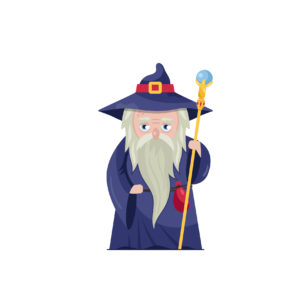
Whether in medieval or modern times, the word “witch” has usually been applied to or reclaimed by women. Sadly, harmful stereotypes have surrounded the term for centuries, resulting in the deaths of many innocents. As interest in alternative religions grew in the late 20th century, more pagan women began calling themselves “witches.” A growing number of male witches are also joining their ranks, embracing a term with a historically gendered connotation to describe their spirituality and magickal practices.
How Witches Became Gendered
Multiple sources speculate on the origin of “witch,” but most believe it was likely derived from a specific set of Germanic and Old English cognates. The Online Etymology Dictionary points to the Old English word “wicce,” a feminized form of “wicca,” which meant “sorcerer” or “wizard.” It might share some similarities with the Low German verb “wikken,” which translates as “to use witchcraft.” Others suggest as candidates the Old English word “wigle,” which signified the act of divination, or a Proto-Germanic word “wikkjaz” that translates to “necromancer.”
The assertion that “witch” could be derived from the feminized “wicce” may point to a feminine connotation that developed over the centuries. The OED entry cites several examples of usage in European works throughout the Middle Ages where it specifically referred to women who were either considered wise, served as healers, or were thought to practice witchcraft or pre-Christian folk religions. OED also informs readers that by the early 1600s, some writers began using the term “men-witches” or “he-witch” to signify males who practiced healing, divination, or spiritual paths usually associated with women.
Gerald Gardner, Witchcraft, and Modern Wicca
In a 2017 Patheos blog post, columnist Jason Mankey discusses the usage of the terms “Wicca” and “Witchcraft” and how the two can overlap, depending on the practitioner. Mankey, who calls himself a Gardnerian Witch, reveals that Gerald Gardner, a founder of the modern Wiccan movements, first called his new religion “Witchcraft” in two of his first books:
- “Witchcraft Today,” published in 1954
- “The Meaning of Witchcraft,” released in 1959
Whether Gardner was the first man in the modern West to call himself a witch may not be easily verifiable. However, other men have joined him within the last few decades as they engage in their own ritualistic practices and join covens.
Queer and Transgender Male Witches
A significant number of men reclaiming the term “witch” may be from queer and transgender communities, as speculated by one witch interviewed by Broadly contributor Michael Halford in a 2015 writeup. “I don’t know of any straight male witches,” he confessed. “Witchcraft is highly involved in subverting the patriarchy and retaking ownership of sexuality outside of masculine power structures.”
The openness of queer and trans men to call themselves “witches” or embrace magick, shamanism, and other practices seen as feminine in the Western world is not surprising. In an October 2017 Them piece, writer Lewis Wallace explains that many LGBTQ people raised as Christians do not find acceptance within their original circles of faith and claiming witchcraft may be a form of “resistance to Christian hegemony.” Meanwhile, Vice writer Moira Donovan profiled Jared Russell, a Canadian witch turning gender expectations on their head by dressing in witch’s garb in his public and private ritualistic practices.
Sacred Spirituality Outside the Gender Binary
Spirituality is inherently a personal journey. For some men, it involves “coming out of the broom closet” and choosing to identify as witches. Besides fighting the negative connotations given to the term over the centuries, these men challenge patriarchal norms and ideas centered in toxic masculinity. At the same time, some also seek spiritual paths that give sacred meaning to their queerness and gender experiences. Together, they forge new ways of being and understanding in our world.

